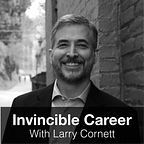
“Being memorable equals getting picked.” — Jeffrey Pfeffer1
When we meet people for the first time, they decide how they feel about us in 1/10th of a second.
I know that sounds crazy. But, research2 has found that people can glance at a person’s photo for less than a second and make judgments about attractiveness, likability, competence, trustworthiness, and aggressiveness.
When they walk away from our conversation, they will most likely forget our names in a few seconds and won't remember most of us within a few days. Sadly, most people forget 90% of what you shared with them after 48 hours.3
The foundation for becoming more memorable starts with attention. People don’t remember something or someone if their attention isn’t captured in the first place. Fair or not, we pay more attention to people when we’re drawn to them.
Who receives more attention? Likable people.
Maybe you don't care about being likable, and that's okay. But, it does help in some situations, whether you like it or not.
Setting up the conditions for memorability triggers a cascading chain of events:
Likable people attract more attention.
Novelty, surprises, contrasts, and contradictions also capture attention.
People who capture attention have a fighting chance of being remembered later.
Memorable people receive more opportunities.
Why does memorability matter?
“No one who is unmemorable is going to be chosen for an important job, because one cannot select what one cannot remember.” — Jeffrey Pfeffer4
There are times when making a great impression in the moment is more important than being memorable. If a decision is being made on the spot (e.g., a final job interview), memorability doesn’t have to be at the top of your list. You need to close the deal now.
However, our lives are not a frantic race from finish line to finish line. If anything, we seem to engage in multiple overlapping marathons that never really end. They simply dovetail into the next level of pursuits.
The long game does matter:
The people you meet at a conference today may want to reach out to you about an opportunity a year from now. But, only if you made a memorable impression.
Your boss may want to consider you for a promotion later this year, but only if you immediately come to mind.
Someone on Twitter may think of you for a cool panel discussion in a few months, but only if you’ve been crafting memorable tweets that keep grabbing their attention.
Excellent opportunities — both personal and professional — most frequently come from consistent hard work, long preparation, and people remembering who you are. If they don’t even know that you exist, you will not come to mind when it’s time for them to decide who to hire, promote, and collaborate with later.
What makes you memorable?
It isn’t easy to precisely pin down what makes someone memorable. In part, this is because we each have our own interests, patterns of attraction, and things that we value in others.
Perhaps it’s easier to think about what makes things unmemorable. Consider your daily life, activities, meals, people you meet, etc.
When things follow the same, predictable pattern, everything blends into an endless stream of homogeneity. If you eat a cheese sandwich on wheat bread every day for lunch, you won’t remember any of your lunches as memorable. If the people you meet behave much like all of the people you meet, no one will stand out.
Memorability is about contrasts and contradictions:
Things that surprise us are memorable.
People who stand out from others are memorable.
People who exhibit intriguing contrasts and contradictions in their personality and behavior catch your attention and are memorable.
I look back on my 50+ years of life, and very few people come to mind. They are memorable for me often because of their surprising uniqueness, contrasts, and contradictions.
I remember the custodian I often talked with on campus who had a Ph.D. but had grown tired of the stress of academic life and escaped it to work alone in the evenings in the art building where he could enjoy the gallery and seeing the students’ works in progress.
I remember the smart and talented professor who had paid his way through school by being a bouncer and cage fighter.
I remember the quiet, introverted, and seemingly serious designer by day who was a standup comedian by night.
“Different is BETTER than better.” — Sally Hogshead
It’s almost impossible to be the best. After all, there is only one best.
It’s a lot easier and more achievable to be unique. There is only one you in the entire world.
We all have quirky interests and contradictions in our personalities. But, society tends to encourage us to suppress and hide them. We want to fit in with our friends in school. We’re afraid to stand out, be different, and risk being excluded.
We also think that we need to fit in at work, can’t be too weird, and don’t want to make waves. In fact, many employers will often interview for “culture fit” and discourage employees from rocking the boat.
However, the people who tend to excel in their careers are willing to risk breaking free from conformity. They’re not afraid to think differently and spawn innovation that others can’t even dream of.
If you want to be memorable, be kind when others are cruel. Be strong when others are weak. Dare to question authority when others are quiet and afraid. Dare to challenge the status quo, be true to yourself, and seek ways to make the world a better place.
Blend your unique personality, interests, hobbies, and background with your professional brand. It’s so boring to see people describing themselves in the same way as everyone else on LinkedIn, Twitter, etc.
Share your interesting contrasts as part of your intro and bio. That’s why my LinkedIn headline states: “Leadership Coach & Business Advisor in NorCal | Invincible Career® | Tech geek | Nature lover | Powerlifter | Trail runner.”
Do powerlifting, trail running, and nature have anything to do with being a leadership coach? Not directly. But, my headline is unique to me and makes me stand out from the thousands of other leadership coaches (I hope!).
Be memorable in a good way
This probably goes without saying, but here I am saying it. Strive to be memorable for all the right reasons.
You don’t necessarily have to be likable to be memorable (more on that in the next section). But, people who are memorable in a good way are often likable as well.
There is research5 that has examined what makes people likable, memorable, and more successful. Additionally, likable people tend to be more successful. For example:
Likable people are more likely to get hired.6
They are more likely to get promoted.7
They are more likely to keep their jobs.8
Likable leaders also tend to be viewed as effective leaders.
“The results are very clear – there is no harm in being liked by your subordinates and our research certainly suggests that it is part of being viewed as an effective leader. This means that well-liked leaders can expect subordinates to consider them as authentic, transformational, ethical, and not abusive. Likewise, teams who like their leaders will be happier at work, go above and beyond what is required of them, experience greater well-being, and perform at a higher level.“ — from Why Likable Leaders Seem More Effective, Harvard Business Review9
Some of the following suggestions for positive memorability might not fit your personality. But, hopefully, a few of them will come in handy the next time you meet someone.
Be truly friendly
Smile and laugh
Use good eye contact and positive body language
Show a genuine interest in others
Ask relevant questions
Share the spotlight
Be kind and helpful
Be generous
Be funny and witty
Tell interesting and unique stories from your life
Be authentic
Be open-minded
Be reasonably vulnerable10
Be well-read and up-to-date on relevant news
Do your homework so you can have interesting conversations
Don’t be memorable in a bad way
As I was researching and writing this newsletter, I thought about how memorability is a polarizing quality. Some people are memorable for all the right reasons. Others are memorable for all the wrong ones.
For example, I had a call with someone today, and he mentioned that he has a shortlist of people he will never, ever work with again. Those people are certainly memorable for him, but I don’t think any of us want to be easy to remember because we’re toxic coworkers or terrible leaders.
This advice may sound obvious, but I think some folks missed this chapter in the book on How to Be Memorable. They love being argumentative and bombastic and seem to enjoy having a reputation of being “difficult to work with.”
Why? I’m not sure. Perhaps they feel like they are being true to their authentic selves.
However, that’s a long and lonely professional road to walk. I know some people like this. No one goes out of their way to recommend them for new opportunities or be their advocate when someone calls and asks for a reference.
Memorability mistakes
Sadly, some folks seem confused about what it takes to be noticed and remembered. They think that being aggressive, loud, and self-promotional is how one captures attention and becomes memorable.
As one recent example, I've been popping into Clubhouse rooms11 over the past few weeks and witnessed truly cringe-worthy behavior:
Lots of bragging (e.g., “Of course, I'm always invited into the biggest investment meetings.”)
Self-proclamations (e.g., “I've always been really funny”)
Interrupting others (e.g., “Oh, that’s nothing! Let me tell you my story.”)
Self-promotion (e.g., “Everyone always says I'm the best person to have in a sales meeting”)
Cutting people off and hogging the mic won’t get you noticed — well, at least not for any good reasons. Bragging about yourself won't make you memorable in a good way.
Of course, we all hope to be memorable. But, don’t try so hard that you end up making a terrible impression. Avoid oversharing, telling your entire life story, dominating conversations, and making it all about you.
Venue does matter
It's hard to get noticed on a service like Clubhouse. Many of the likability signals I mentioned aren't available (e.g., smiling). You're competing with way too many other people to be heard.
To be fair, many of my memorability tips don't work well in any typical crowded networking event. Everyone clusters around a few popular people, trying to be noticed and shouting to be heard.
However, you increase your odds of being memorable in small group settings and one-on-one discussions. Lunchclub.ai12, for example, is better for this than Clubhouse. Or, as I’ve recommended before13, you should be the one giving a talk “on stage” (physical or Zoom).
It’s a lot easier for people to remember the few speakers at an event than the hundreds of people they meet from the audience. I’ve always had a better “networking experience” as a panelist or speaker versus another attendee.
If you want to be more memorable and make a lasting positive impression, choose your venues wisely and play to your strengths when deciding how you want to engage with people.
Leave a comment below if you have any additional suggestions, thoughts, or questions! 😊
This week’s professional development challenge
⭐ Create Your Elevator Pitch
What do you want to be known for? What matters the most to you? Career opportunities come more easily when you stand out and stand for something.
Larry Cornett is a leadership coach and business advisor who runs a supportive online community. He lives in Northern California near Lake Tahoe with his wife and children, and a gigantic Great Dane. He does his best to share advice that can help others take full control of their work and life. He’s also on Twitter @cornett.
Power: Why Some People Have It — and Others Don't by Jeffery Pfeffer (that’s my affiliate link)











